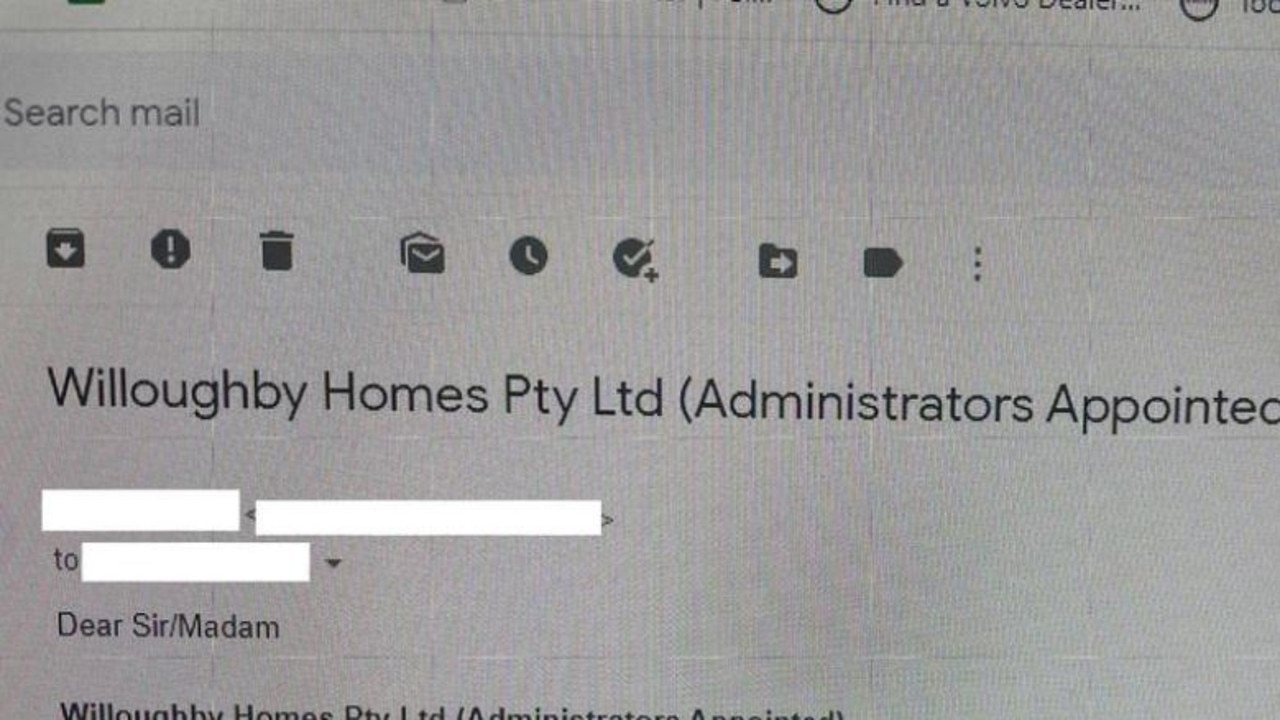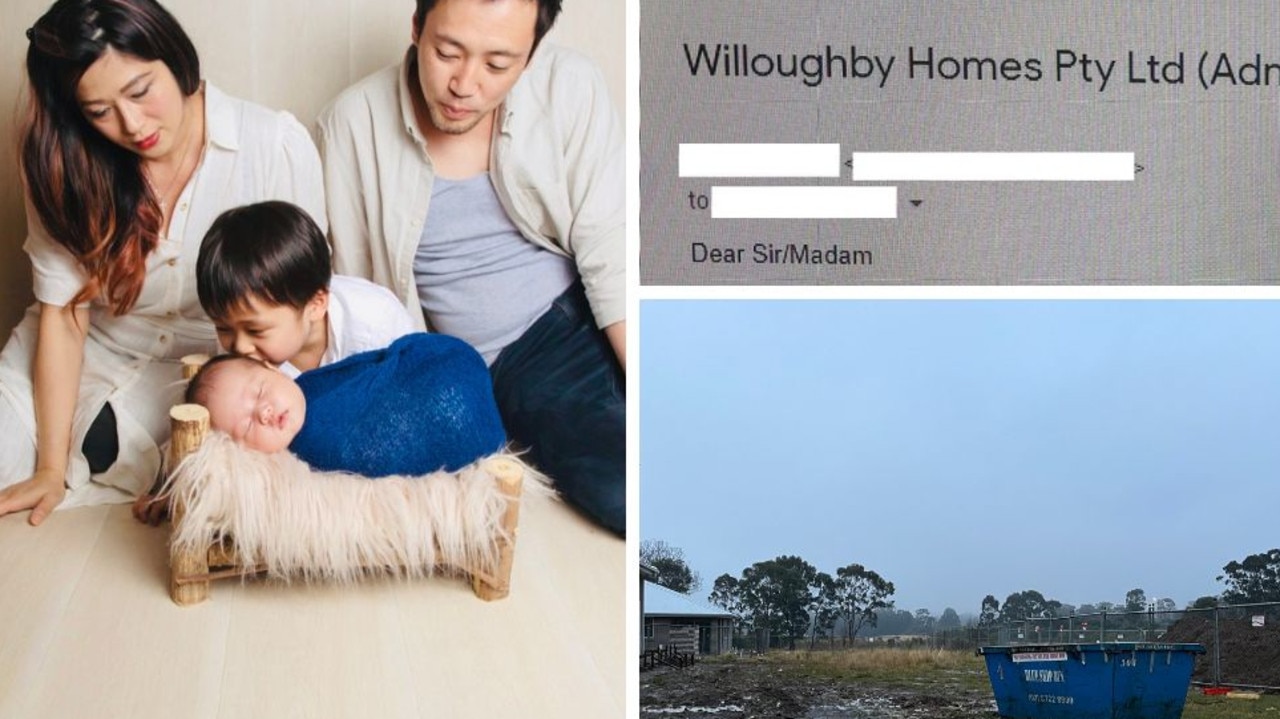The stark reality of a building company’s collapse has been laid bare after the firm proposed that trade creditors would receive 10c back for every dollar they were owed.
On Wednesday afternoon, Sydney-based builder Willoughby Homes was brought to court with creditors calling for it to be put into liquidation because the business was “hopelessly insolvent”.
Gyprocking company Regno Trades initiated legal proceedings against Willoughby Homes early last month over an unpaid debt of $184,000.
That means if they followed through on Willoughby Homes’ proposal for receiving 10c in the dollar, Regno Trades would only recover $18,400 – leaving them $166,000 out of pocket.
Two business days before the hearing, Willoughby Homes appointed David Mansfield and Jason Tracy of Deloitte’s turnaround and restructuring department as voluntary administrators, causing creditors to suggest this was an “11th hour” attempt to save the company.
Judicial Registrar Claire Gistham, of the Victorian Supreme Court, granted the administrators of Willoughby Homes an adjournment until the end of the month to come up with an official Deed of Company Arrangement (DOCA), which is essentially a plan for creditors to get their money back.
In the heated court case, representatives of creditors argued that the company had “failed so miserably” and should be wounded up immediately because there was “an overwhelming case for insolvency”.
During the hearing, it was also revealed that Willoughby Homes owed up to $4.4 million to homeowners, trade creditors and the tax office.
Despite that, the construction firm has “minimal assets” and only has $14,000 in liquid cash in its accounts at the moment.
It comes after an extensive news.com.au investigation over the last month found Willoughby Homes has been non-functional for some time, with debts to creditors going unpaid, build sites stalling for as long as a year, the company’s home building insurance not being reinstated and finally, all its offices being cleared out and phone lines going straight to voicemail.
Stream more business news live & on demand with Flash. 25+ news channels in 1 place. New to Flash? Try 1 month free. Offer ends October 31, 2022 >
Regno Trades acted as the plaintiff while three supporting creditors also joined the case – H & R Interiors owed $73,925, an ex-employee owed $53,000 in unpaid wages and Finese Electrical and Air Conditioning, owed $4531.
Another creditor, Kamaljit Pawar, also joined the case. The Sydney man built a house with Willoughby Homes in 2014, which was left with significant defects and he has been fighting to have them fixed ever since.
There are 44 impacted homeowners, 16 of whom have houses at “varying stages of construction” while the other 28 customers have handed over deposits but no building has commenced.
There are also a number of creditors and employees impacted. It’s understood employees are owed $67,000 in unpaid superannuation and about $600,000 is owed to deposit holders. Over a million is owed to the Australian Taxation Office.
There was debate about how much the company actually owes in total, with administrators putting the figure at $2.3 million but Mr Pawar’s lawyer Rodney Kent said he’d reviewed documents and said it was higher.
“There are substantial defaults” amounting to $4.5 million, he said.
Mr Kent also added that the owner of Willoughby Homes, Steve Willoughby, had four properties and possibly five, which could be sold to pay back debts.
SC Peter Fary, acting for the plaintiff and three supporting creditors, called for Willoughby Homes to be placed into liquidation because it had “failed so miserably”.
“This isn’t the first winding up application, in fact it’s not even the first winding up application this year,” he said.
“One has to ask why the director hasn’t caused the company to address its insolvency at an earlier point in time.”
He said it made no sense for the company to remain in administration because Willoughby Homes was unable to carry out any construction work.
“Is it seriously suggested that a company with no capital will continue building contracts in administration where it failed so miserably before?” I have asked the court.
“These matters go to another issue of commercial morality,” he added, urging the registrar to consider “Whether as a matter of commercial morality it’s appropriate for this company to continue in existence”.
Mr Fary said Willoughby Homes had “minimal assets and significant liabilities”.
In the hearing, it was stated Willoughby Homes only had $14,000 in cash as well as some motor vehicles, property and equipment that it could sell to pay back debts.
Administrators called in at the ’11th hour’
The lawyers representing creditors were also critical of the last minute appointment of administrators, last Friday, when they said it appeared likely that the firm had been trading insolvent for months.
“This is an 11th hour appointment, the appointment of an administrator at the last minute should be treated with skepticism,” Mr Fary said.
“One can’t escape the conclusion of these facts that there is likely to be an insolvent trading claim of a significant magnitude.
“One can readily infer that insolvency was some time ago.”
Mr Kent agreed, adding: “This is so late in the day and so inappropriate… Deposit holders have lost their money in circumstances where signing contracts was totally illegal.”
However, the administrator’s legal team argued that it was far from an 11th hour appointment.
QC Hugh Smith, representing the administrators, argued, “We’ve all been involved in 11 hour appointments, this is not that.”
Administrators were appointed late on Friday, giving them two business days – Monday and Tuesday – to sort out the company’s finances.
“As such this is not an 11th hour appointment,” Mr Smith insisted.
In another twist, the administrators insisted that a category of creditors – the deposit holders – be paid back in full while all the other credits only received 10c in the dollar.
The Deloitte administrators held a meeting for deposit holders only on Monday ahead of the court hearing and claimed a vote was 100 per cent in favor of the resolution to keep the company in administration so that they would receive their promised funds.
However, register Gistham grilled the QC on how many people actually voted, which turned out to be only 15 people.
“The priority here is quite extraordinary, on the one hand you’ve got 100c in the dollar, and the other hand is 10c to the dollar,” Mr Fary said.
“My client is as vulnerable as anybody else, all of their businesses are at risk of going under as well if they’re not paid,” Mr Kent added.
Later on, in a conversation with news.com.au, Mr Kent added: “It’s disappointing that their first meeting only involved certain creditors and not all of the creditors. I’ve never seen this done before. My client didn’t even know that meeting was taking place.”
After opposition, the administrator’s lawyer indicated they would reconsider whether 10c in the dollar was appropriate compared to 100c in the dollar for deposit holders.
The registrar added the case until August 31.
.

